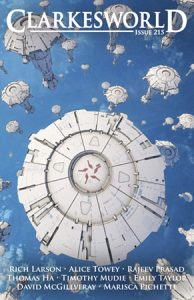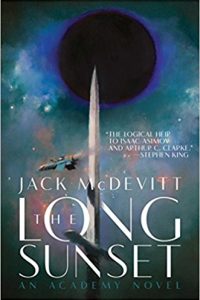Clarkesworld: Short Fiction Reviews by A.C. Wise
“Every Hopeless Thing” by Tia Tashiro in the July issue of Clarkesworld is a sweet story about a spacefaring pilot, Elodie, who while scavenging on a supposedly abandoned Earth discovers a whole population living underground. The story carries emotional weight and paints a lovely picture of finding hope in seemingly hopeless times. “The Best Version of You” by Grant Collier is another story that packs an emotional punch. Eudaimon is a company claiming to help people become their best selves by giving them the ability to hack their brains with nanobots and only feel what they want to feel. Maria is one of the few unhacked humans, living on a pain preserve, a park ranger tasked with maintaining the land and liaising with Eudaimon’s ambassador. The story moves seamlessly between past and present, as Maria’s mother considers, then ultimately chooses ascension, and Maria chooses to remain unaltered. It’s a lovely and nuanced exploration that doesn’t hold either character’s viewpoint up as right or wrong, examining what makes someone human, and showing a grounded, imperfect, but still loving relationship between two people with fundamentally different worldviews.
“Aktis Aeliou, or the Machine of Margot’s Destruction” by Natalia Theodoridou is a beautifully written story that considers what it is to love and be loved, as Margot crash-lands on a planet and makes first contact with a god-like being who humans once knew and worshipped as Apollo. “Born Outside” by Polenth Blake is another story that considers what it means to be human. Tulip’s aunt found them when the pods first landed; they are a pod person but remember what it’s like to be the first Tulip, their aunt’s baby who died the day the pods came. The story does a lovely job of looking at different forms of caring and understanding, while also delving into the nature versus nurture question. “I Will Meet You When the Artifacts End” by Amal Singh is a story about hope and searching for connection on a generation ship. Noori communicates with a man named Jai who she has feelings for, but has never met, before learning she and her biome must go into cryosleep to preserve resources. She wakes fifty years later feeling disconnected, but finding several messages from Jai waiting for her, helping her to move forward with hope despite all the questions regarding her future and their relationship that are left unanswered.
“Stellar Evolutions in Pop Idol Artistry” by Em X. Liu is another story that looks at the role memory plays in defining the essence of a person. Mingming is a pop idol without much freedom, trying to figure out what he wants from life. As his contract comes to an end, he learns he may not be who he thought he was, leaving him to question the truth of himself and his life. “The Happiness Institute” by AnaMaria Curtis pairs nicely with Grant Collier’s story. In the wake of war, a group of scientists is tasked with building a happiness institute, leading each to question what happiness even means. Like Collier, Curtis doesn’t take a position, but provides a satisfying exploration of the question and its various possible answers.
In “The Time Capsule” by Alice Towey in the August issue of Clarkesworld, Corinne finds a probe crash-landed in the desert and sets out to sell it to pay off her town’s debt, forcing her to double-cross the buyer who tries to double-cross her. “Molum, Molum, Molum the Scourge” by Rich Larson is a slick cyberpunk story with an excellent voice. Molum is a former gladiator, struggling to keep his implants fed now that fighting has been outlawed. He encounters a young person named Kidge – a fan and aspiring gladiator themself – who claims they can hook Molum up with a shipment of feed. Molum senses a trap, but has little choice but to follow Kidge, bringing him face-to-face with a past he would rather forget.
“Canyon Dance” by Rajeev Prasad is a poignant slice-of-life story where the narrator has chosen a nomadic, spacefaring lifestyle with his family to avoid relapsing into alcoholism. His wife requires medical treatments, which would force them to settle in one place for several months, bringing up old temptations and demons, ultimately leaving the family to make difficult but necessary choices for their individual and collective well-being. In “Where My Love Still Lives” by Emily Taylor, Ruby encounters her former lover Augie, bringing up old memories and painful emotions. They still care deeply for each other but could never see eye to eye on Ruby’s profession as a harvester, which left Augie never knowing if she would come back home alive, leading them to go their separate ways.
In “The Sort” by Thomas Ha a parent and their child, who are both modified humans – a practice viewed with suspicion and outright hostility in various parts of the country – come across a strange local festival during a road trip. Ha does a wonderful job imbuing the story with an underlying sense of threat and tension, with the festival making it quite clear what the locals feel is the “right sort” of people. “Something Crossing Over, Something Coming Back” by Timothy Mudie offers up yet another effective exploration of the tie between memory and selfhood. The protagonist is a spy, inserted into his target’s mind via a transfer serum, so he can take over the life of a scientist named Zi-Lind. When his handler is arrested, he is trapped in Zi-Lind’s life for longer than expected, developing a relationship with Zi-Lind’s wife, and feeling conflicted about his mission and his own identity. The story puts a unique spin on the idea of a spy living in deep cover, developing an almost parasocial relationship with the person whose life he’s inhabiting.
In “The Deformed Saint and the Poison Wind” by David McGillveray, Courier-261 crash lands on an alien world and learns the population there is suffering from radiation sickness from the war that her own people have been fighting. “Three Circuits of the Monoceros Rings” by Marisca Pichette is a story about a throuple, each living on separate ships, alone, and traveling through space, finding ways to stay connected. It’s a beautifully written look at love enduring despite distance, and the power of art and food to bring people together.
Recommended Stories
“The Best Version of You”, Grant Collier (Clarkesworld 7/24)
“Molum, Molum, Molum the Scourge”, Rich Larson (Clarkesworld 8/24)
“Something Crossing Over, Something Returning”, Timothy Mudie (Clarkesworld 8/24)
“Three Circuits of the Monoceros Rings”, Marisca Pichette (Clarkesworld 8/24)
This review and more like it in the October 2024 issue of Locus.
 While you are here, please take a moment to support Locus with a one-time or recurring donation. We rely on reader donations to keep the magazine and site going, and would like to keep the site paywall free, but WE NEED YOUR FINANCIAL SUPPORT to continue quality coverage of the science fiction and fantasy field.
While you are here, please take a moment to support Locus with a one-time or recurring donation. We rely on reader donations to keep the magazine and site going, and would like to keep the site paywall free, but WE NEED YOUR FINANCIAL SUPPORT to continue quality coverage of the science fiction and fantasy field.
©Locus Magazine. Copyrighted material may not be republished without permission of LSFF.







